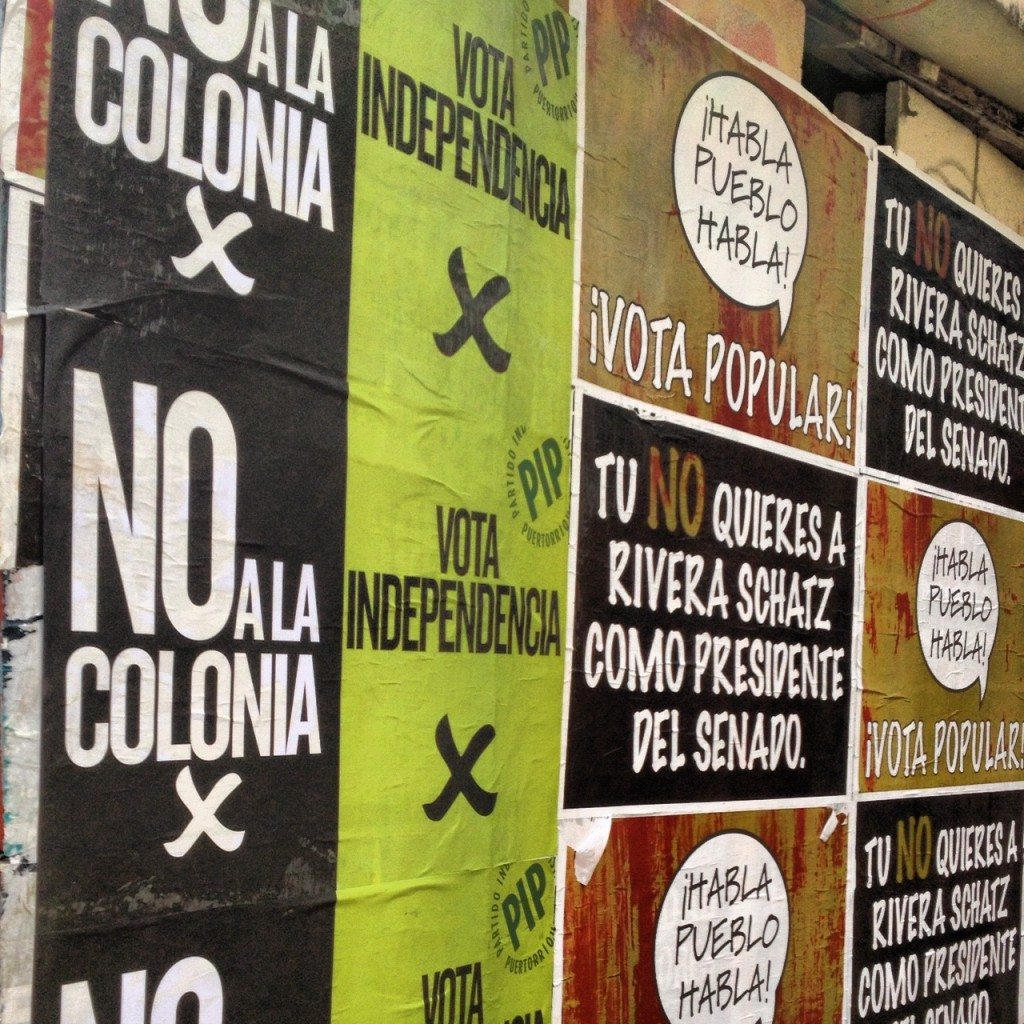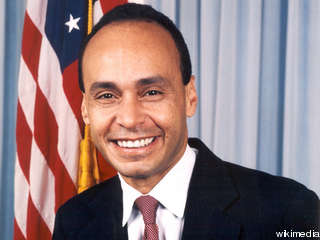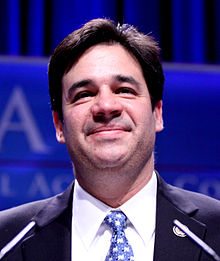Editor’s Note: Latino Rebels published Samuel’s first piece yesterday
Full Disclosure: I am personally in favor of Statehood for Puerto Rico.
This is Part Two of my piece to provide conservatives at least a general back story on Puerto Rico, its relationship with the United States, and why the status issue matters for conservatives and the GOP going forward.
What Happened on November 6 and What Happens Next
Even though Puerto Ricans could not vote for President on November 6, they still had every reason to go to the polls. In addition to elections for Governor and Resident Commissioner, another plebiscite was held to get a clearer picture of what Puerto Ricans wanted regarding their relationship with the United States.
The intent of the plebiscite was to (hopefully) eliminate any ambiguity about the desires of the island that previous plebiscites and referenda had created. The plebiscite had two layers of questioning (to paraphrase):
- Do you wish to keep the current status of Puerto Rico? Yes or No
- If No to Question 1, what status do you wish Puerto Rico to have?
- Independence
- Statehood
- Sovereign Free Association
“‘No” on Question 1 received 54% of the vote. Of those who voted against the status quo, “Statehood” received over 61% of the vote. The message was clear that, at a minimum, Puerto Ricans are not satisfied with the status quo and desired a change in relationship with the United States.


So what happens now? Unfortunately for those on the island, it is not up to them anymore. At the end of the day, Puerto Rico is beholden to Congress as far as effectuating any policy change regarding the island’s status. A bill must be drafted, negotiated, and passed to grant Puerto Rico statehood. While the Obama White House has expressed a passing interest in addressing the issue, that will not be enough to build any sort of political momentum in Congress.
The status issue in Puerto Rico is by no means a left and right issue. The most public example is the relationship between former Governor Fortuño and Puerto Rico’s Resident Commissioner Pedro Pierluisi. Both are members of the New Progressive Party, but Fortuño is a Reagan Republican while Pierluisi is on the left, endorsed Obama, and caucuses with the Democrats in Congress. Yet, both campaigned together on the island in 2012. You had members of the PNP at both the Republican and Democratic National Conventions in 2012, and you have politically conservative Puerto Ricans on the mainland who are opposed to Statehood, and liberal Democratic Puerto Rican members of the House who are what I like to call “Independentistas.” That being said, the Republican Party in Puerto Rico is an open advocate of Statehood, while the Democratic Party is more in favor of Commonwealth/Status Quo. The status issue creates very strange bedfellows both on the island and in the United States.
The biggest problem for Puerto Ricans (who are in favor of statehood) is actually Congress, where they have very few allies, even among the Congressional Hispanic Caucus (CHC). This is where politics comes into play. Congressman Luis Gutiérrez (D-IL) has long been the standard-bearer for Hispanic Democrats in Congress. He has been at the forefront of comprehensive immigration reform for years, and is the leader of the CHC. However, he is anti-statehood and has not been afraid to say it. The reason for this is because Rep. Gutierrez has long been in favor of Independence. The same goes for Nydia Velázquez (D-NY), representing Spanish Harlem. They are the “Independentistas,” as I referred to earlier.
The GOP can take advantage of the opportunity of a divided Democrat caucus on statehood. While immigration reform is going to be the primary “Hispanic-centric” issue addressed in the foreseeable future, the GOP can take the initiative by endorsing statehood, or at the very least bring the issue to light in American media. Now, I am not naïve. I know there will be hostility from conservatives on the idea of statehood such as its costs and possible voter allegiance. But this is another issue the GOP can at least address that affects a core segment of the Hispanic vote within the United States.
Congressman Raúl Labrador (R-ID), a Puerto Rican-born, Tea Party-backed conservative, can and should be at the forefront of addressing status and force Gutieerrez and the other supposed “spokespersons” for Puerto Ricans in Congress to explain why he does not want to move forward with the desires of many of his representatives. To borrow a line from my colleague Brittney Morrett (@bmorrett), how great of a sound bite is it for a GOP politician to rhetorically ask Rep. Gutiérrez, “Why do you want to immediately grant federal voting rights to illegal immigrants, but not to 4 million US citizens?”
Conclusion
Puerto Rico’s history with the United States has been a complex one: imperialism, terrorism, sovereignty, and self-determination are the prevailing themes. This guide is meant to be informative for many conservatives who (rightly) have not given much thought about the Caribbean island until now, either as to its historical relationship with the United States, or how the politics could play out if the status issue hits American media. I don’t claim to be a certified expert on everything Puerto Rico, but the status issue has become a personal passion of mine. Hopefully, this piece can give conservatives a foundation to build upon when Puerto Rico eventually gets its day in the sun.
Samuel A. Rosado, Esq. is an attorney from New Jersey. He served as Executive Director of the Republican National Hispanic Assembly of New Jersey in 2010, and has been a freelance contributor and writer on Hispanic issues and engagement for Politic365, The Daily Grito, and Misfit Politics. Follow him on twitter at @SARosado.





I went to Law School with Mr. Rosado, and while I am a Democrat, and fairly liberal in ideology, I fully agree with him on the issue of Puerto Rico here. My preference is they become a State, and I would bring in DC as a State as well, but I admit PR is unique. If Puerto Rico decided they wanted independence over Statehood, I would respect that decision, although I think it is short-sighted.America is a bigger concept than anyone’s political agenda would limit it to. One cannot be the land of equality, liberty, and opportunity….if they have millions of citizens relegated to an inferior status of citizenship. As such, the ability to fully participate in the democratic machinery of the nation is vital to the very ideals this nation was founded upon.Anyone trying to conduct the political calculus and THEN determine whether they support the expansion of Statehood or not, should ask whether they think G Washington or A Lincoln took politics into account in when they decided whether New England was worth fighting for, or whether the South was worth holding on to.No, such great Americans saw the big picture, and understood what it means to be an American, and have the spirit of 1776 still alive within them. I would urge all readers to do as the author asks, stop and THINK about this disparity within our borders, and then see whether any logical reason (beyond pretextual) exists to allow the status quo to remain.J. Ryan McNelis, Esq.
@J Ryan McNelis The BEST argument is the citizenship one given the context of immigration reform.
[…] he points out, could run for President of the United States, but could not vote for himself. Latino Rebels also posted an essay recommending this initiative to Republicans. Author Samuel A. Rosado says, […]
I´m getting a little worried that the whole discussion of status is always reduced to economics. I want to talk about culture. Do you want a Puerto Rico without lechón, Spanish, & the smell of coffee? Do you want a PR without its body language, personality, salsa, su manera de ser, its idiosyncracies? In other words, do you want a McDonald´s version of PR? Because that is what statehood will eventually bring to the island.
I know whereof I speak. I have lived in the US since 1965. I now live in New Mexico. I´ve been to Hawaii, I´ve read about Alaska. There is something in common to all these states, along with California: they all became states in the last 150 years. In that time the following has happened in ALL OF THEM:
1. Land once owned by local (usually poor locals btw) was picked up cheap by Anglo investors.
2. The Anglos were immediately the powerful people on site, and the few local wealthies immediately learned to sing their song.
3. Because being –or seeming to be– Anglo was the cool thing, parents came to keep heir kids from speaking Spanish. In NM they were even punished for it both at home and in School. The same happened in western Canada, Alaska, Hawaii, etc.
4. Last to go was the food. In NM the local food traditions are now a commodity to be purchased by tourists.
Of course we want self-determination! That´s only human and a sign that we are maturing as a people. But the idea that statehood would mean that Puerto Ricans would be determining their future is simply not supported by the historical facts. I wish I could say that the steamrolling of other cultures is an Anglo vice –it surely looks that way– but in fact, the Spanish and the English did precisely the same thing to native Americans. Steamrolling other cultures is what dominant cultures do. Resisting that is what true patriots do.
It is a mystery to me how American LIBERALS can be for statehood. Assimilation is not a liberal value.